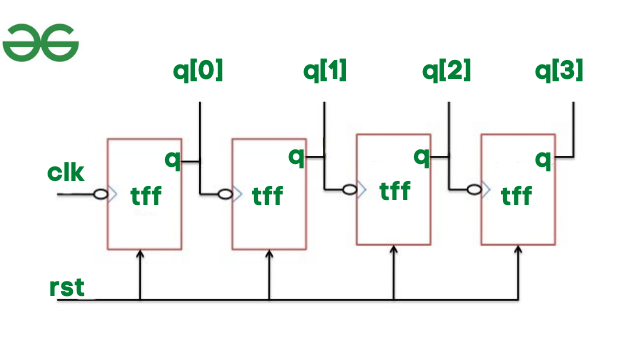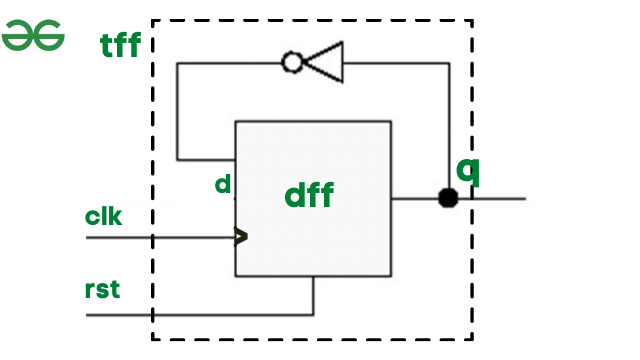Verilog HDL 中的 4 位纹波进位计数器
要继续 Verilog 代码,我们首先要了解 4 位纹波计数器的结构。顶部设计块由四个 T 型触发器组成。暂时忽略T-Flip Flop的输入输出。让我们考虑一下 Ripple Counter 的整体外部结构。我们有两个输入,即时钟和复位,q 是输出。输出 q 为 4 位向量形式。

4位纹波进位计数器
在纹波进位计数器中,首先,时钟信号通过第一个 T 触发器。对于第二个 T 型触发器,第一个 T 型触发器的输出充当时钟,依此类推。所有 T 触发器的复位都是相同的。
现在让我们实现涟漪计数器块。
module ripplecounter(clk,rst,q);
input clk,rst;
output [3:0]q;
// initiate 4 T-FF to update the count
tff tf1(q[0],clk,rst);
tff tf2(q[1],q[0],rst);
tff tf3(q[2],q[1],rst);
tff tf4(q[3],q[2],rst);
endmodule
由于我们在ripplecounter中实例化了tff,现在让我们看看T Flip Flop的内部。在 T 触发器内部,我们有一个 D 触发器和一个反相器,即不是门。为了实现 T 触发器,我们需要实例化 d 触发器,我们将 clk 和 reset 作为输入,将 q 作为输出。我们需要一根额外的导线 d,它进一步充当 D 触发器的输入。
module tff(q,clk,rst);
// tff takes clk and reset as input
// q is output
input clk,rst;
output q;
wire d;
// by referring the diagram of tff,
// instantiate d flip flop and not gate
dff df1(q,d,clk,rst);
not n1(d,q);
endmoduleD触发器真值表供参考:
| clk | rst | d | q |
|---|---|---|---|
| ⇡ | 1 | x | 0 |
| ⇡ | 0 | 0 | 0 |
| ⇡ | 0 | 1 | 1 |
设计块:
module ripplecounter(clk,rst,q);
input clk,rst;
output [3:0]q;
// initiate 4 T-FF to update the count
tff tf1(q[0],clk,rst);
tff tf2(q[1],q[0],rst);
tff tf3(q[2],q[1],rst);
tff tf4(q[3],q[2],rst);
endmodule
module tff(q,clk,rst);
// tff takes clk and reset as input
// q is output
input clk,rst;
output q;
wire d;
// by referring the diagram of tff,
// instantiate d flip flop and not gate
dff df1(q,d,clk,rst);
not n1(d,q);
endmodule
module dff(q,d,clk,rst);
input d,clk,rst;
output q;
reg q; // store the output value
always @(posedge clk or posedge rst)
begin
// refer the truth table to provide
// values to q based on reset.
if(rst) q=1'b0;
else q=d;
endripplecounter
endmodule试验台:
仿真用于通过向 dut 提供输入值来验证设计块。我们需要参考ripplecounter块编写测试台,其中我们有clk和reset作为输入。
时钟需要在特定时间单位后切换,因此我们最初将 clk 设置为 0。然后在每 5 个时间单位后,我们在 always 块下将时钟从 0 切换到 1,反之亦然。
initial
clk=0;
always
#5 clk=~clk;这是ripplecounter的模拟:
module tb;
// input to be stored in reg and output as net(wire)
reg clk;
reg rst;
wire [3:0]q;
// instantiate the ripplecounter design block
ripplecounter dut(clk,rst,q);
// generate clock pulse
// initially provide 0
// then inside always block toggle
// clock every 5 time units
initial
clk = 0;
always
#5 clk = ~clk;
// provide reset values as the input
initial
begin
rst = 1;
#15 rst = 0;
#180 rst = 1;
#10 rst = 1;
#20 $finish;
end
initial
$monitor("time=%g,rst=%b,clk=%b,q=%d",$time,rst,clk,q);
endmodule输出:

可以看出,当reset为0时,输出q有计数器输出更新,计数。